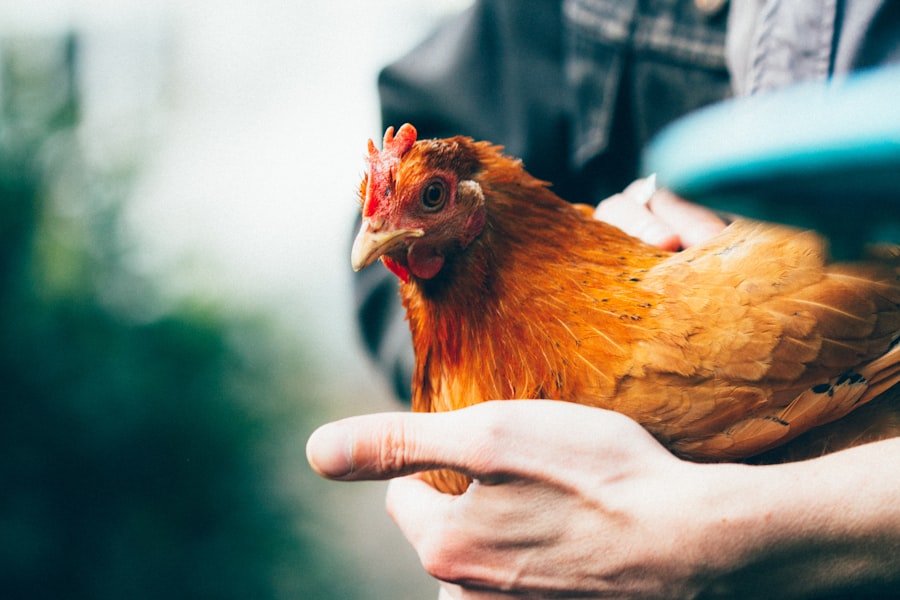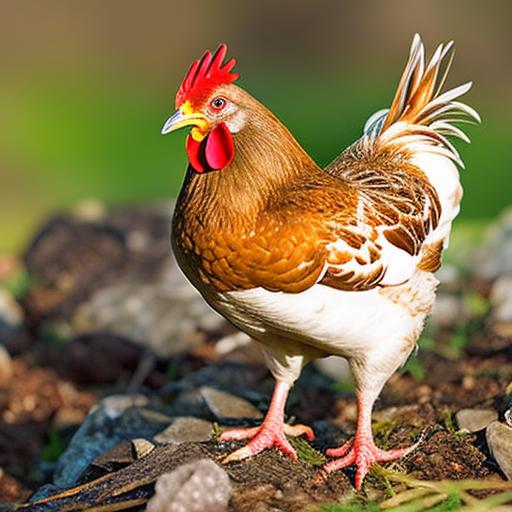Keeping chickens has become a growing trend in urban and suburban areas. More and more people are realizing the benefits of having their own flock of chickens, from the joy of collecting fresh eggs to the natural pest control they provide. Not only do chickens provide a sustainable source of food, but they also make great pets and can be a fun and educational hobby for the whole family.
One of the main benefits of keeping chickens is having a constant supply of fresh eggs. There is nothing quite like cracking open an egg that was laid just that morning. Not only do fresh eggs taste better, but they are also more nutritious than store-bought eggs. Chickens are also great at controlling pests in your garden. They love to eat insects, slugs, and other pests that can damage your plants. By allowing your chickens to free-range in your yard, you can reduce the need for chemical pesticides.
Key Takeaways
- Keeping chickens can be a rewarding and sustainable hobby.
- Planning and preparation are key to successfully raising chickens.
- Choosing the right breed of chickens depends on your goals and environment.
- A well-prepared chicken coop is essential for the health and safety of your chickens.
- Proper feeding, watering, and care are crucial for the well-being of your chickens and the quality of your eggs.
Planning for Your Chickens
Before diving into keeping chickens, it is important to do some research and planning. First and foremost, you need to check your local laws and regulations regarding keeping chickens. Some areas have restrictions on the number of chickens you can have or require permits. It is important to make sure you are in compliance with these regulations to avoid any legal issues.
Another important aspect to consider is the budget and time commitment required for keeping chickens. While chickens are relatively low-maintenance animals, they still require daily care and attention. You will need to budget for things like feed, bedding, and any necessary medical expenses. Additionally, you will need to set aside time each day to feed and water your chickens, as well as clean their coop.
Choosing the Right Breed of Chickens
When it comes to choosing the right breed of chickens, there are many factors to consider. Different breeds have different characteristics, such as egg-laying abilities, temperament, and size. If your main goal is to have a steady supply of eggs, you will want to choose a breed that is known for its egg-laying abilities. Some popular egg-laying breeds include Rhode Island Reds, Leghorns, and Australorps.
If you have children or are looking for a more docile breed, you may want to consider a breed known for its friendly temperament. Some breeds that are known for being good with children and easy to handle include Silkies, Orpingtons, and Sussex. It is important to choose a breed that fits your needs and lifestyle to ensure a successful and enjoyable chicken-keeping experience.
Preparing Your Chicken Coop
A safe and secure coop is essential for keeping chickens. It provides them with shelter from the elements and protection from predators. When preparing your chicken coop, there are a few key factors to consider. First, make sure the coop is well-ventilated to prevent the buildup of moisture and ammonia from chicken droppings. Proper ventilation will help keep your chickens healthy and comfortable.
Next, you will need to provide nesting boxes for your hens to lay their eggs. Each hen will need her own nesting box, which should be filled with clean bedding material such as straw or wood shavings. The nesting boxes should be located in a quiet and secluded area of the coop to provide privacy for the hens.
Lastly, you will need to provide roosting bars for your chickens to sleep on. Chickens naturally prefer to sleep off the ground, so providing roosting bars will help keep them comfortable and safe. The bars should be placed at varying heights to accommodate different sizes of chickens.
Building Your Chicken Coop
When it comes to building your chicken coop, there are several options to consider. You can choose to build your own coop from scratch using plans or blueprints that can be found online or in books. This option allows you to customize the coop to your specific needs and preferences.
If you are not comfortable with building your own coop, there are also pre-made coop kits available for purchase. These kits come with all the materials and instructions needed to assemble the coop. This option is great for those who may not have the time or skills to build a coop from scratch.
Regardless of whether you choose to build your own coop or use a pre-made kit, it is important to follow proper construction guidelines and safety precautions. The coop should be sturdy and secure, with no gaps or holes that predators can get through. It should also be easy to clean and maintain.
Feeding Your Chickens

Feeding your chickens a balanced diet is essential for their health and well-being. There are several different types of chicken feed available, including pellets, crumbles, and mash. Each type of feed has its own advantages and disadvantages, so it is important to choose one that meets the nutritional needs of your chickens.
In addition to their regular feed, chickens also enjoy occasional treats such as fruits, vegetables, and mealworms. These treats should be given in moderation and should not make up more than 10% of their diet. It is important to provide fresh water for your chickens at all times. Chickens can drink a surprising amount of water, especially during hot weather, so it is important to check their water supply regularly and refill as needed.
Providing Water for Your Chickens
Clean and fresh water is essential for the health and well-being of your chickens. Chickens need access to water at all times, as they can become dehydrated quickly. There are several options for providing water to your chickens, including waterers and bowls.
Waterers are specifically designed for chickens and are easy to fill and clean. They come in various sizes and styles, including gravity-fed waterers and nipple waterers. Gravity-fed waterers are the most common type and work by filling a reservoir with water that is then dispensed into a tray or trough. Nipple waterers are a more advanced option and work by allowing chickens to drink from small nipples attached to a water line.
If you prefer to use bowls, make sure they are heavy and stable to prevent tipping. It is important to clean and refill the water containers regularly to prevent the buildup of bacteria and algae.
Caring for Your Chickens
Caring for your chickens involves daily and weekly routines to ensure their health and well-being. Daily care includes feeding and watering your chickens, as well as checking for any health issues or injuries. It is important to monitor your chickens’ behavior and appearance, as any changes could be a sign of illness or stress.
Weekly care includes cleaning the coop and replacing bedding material. The coop should be cleaned thoroughly to remove any droppings or debris. The bedding material should be replaced regularly to keep the coop clean and odor-free.
It is also important to provide your chickens with regular exercise and access to fresh air. If you have a secure outdoor area, allow your chickens to free-range for a few hours each day. This will not only provide them with exercise but also allow them to forage for insects and other natural food sources.
Harvesting Your Eggs
Harvesting fresh eggs from your chickens is one of the most rewarding aspects of keeping chickens. To ensure freshness and safety, it is important to handle and store the eggs properly. When collecting eggs, make sure to wash your hands before and after handling them. This will help prevent the spread of bacteria.
Eggs should be collected daily to prevent them from getting dirty or damaged. Inspect each egg for cracks or other defects before storing them. Cracked eggs should not be consumed, as they can harbor bacteria.
To store eggs, place them in a clean carton with the pointed end facing down. Store the carton in a cool and dry place, such as a refrigerator. Fresh eggs can be stored for up to a month, but it is best to use them within two weeks for optimal freshness.
Troubleshooting Common Chicken Problems
While keeping chickens can be a rewarding experience, there are some common issues that may arise. One common problem is egg-laying issues, such as hens not laying or laying soft-shelled eggs. This can be caused by various factors, including stress, poor nutrition, or health issues. If you are experiencing egg-laying problems, it is important to address the underlying cause and make any necessary adjustments to your chickens’ diet or environment.
Another common issue is health problems in chickens. Chickens can be susceptible to various diseases and parasites, such as mites or worms. It is important to monitor your chickens for any signs of illness, such as lethargy, loss of appetite, or changes in behavior. If you suspect that your chickens are sick, it is best to consult a veterinarian who specializes in poultry.
There are many resources available for addressing common chicken problems, such as online forums or local chicken groups. These resources can provide valuable advice and support from experienced chicken keepers who have likely encountered similar issues.
Keeping chickens can be a fun and rewarding hobby that provides fresh eggs and natural pest control. By doing some research and planning, choosing the right breed of chickens, and providing a safe and secure coop, you can create a healthy and happy environment for your flock. Feeding and caring for your chickens properly will ensure their health and well-being, while harvesting fresh eggs will provide you with a sustainable source of food. While there may be some challenges along the way, there are resources available to help troubleshoot common chicken problems. So why not consider keeping chickens and enjoy the many benefits they have to offer?
If you’re interested in starting to keep chickens, you’ll definitely want to check out this informative article on chicken coop and nest box essentials. It provides valuable insights on how to create a comfortable and safe environment for your feathered friends. From choosing the right materials to designing an efficient layout, this article from Poultry Wizard is a must-read for any aspiring chicken keeper. For more helpful tips and resources on poultry farming, be sure to visit their website at https://poultrywizard.com/keeping-chickens/chicken-coop-nest-box/.
FAQs
What are the benefits of keeping chickens?
Keeping chickens can provide a source of fresh eggs, fertilizer for gardens, and entertainment. They also help control pests and weeds in the yard.
What do I need to consider before getting chickens?
Before getting chickens, you need to consider the amount of space you have available, local zoning laws, and the time and effort required to care for them. You also need to consider the cost of purchasing and maintaining a coop and other necessary supplies.
What kind of coop do I need?
The coop should be large enough to accommodate the number of chickens you plan to keep and provide adequate ventilation and protection from predators. It should also have nesting boxes for the chickens to lay their eggs and roosting bars for them to sleep on.
What do chickens eat?
Chickens require a balanced diet of protein, carbohydrates, and vitamins. They can eat commercial chicken feed, as well as kitchen scraps, fruits, and vegetables. It is important to provide them with clean water at all times.
How do I care for chickens?
Caring for chickens involves providing them with food, water, and a clean living environment. You will need to collect eggs daily, clean the coop regularly, and monitor the chickens for signs of illness or injury. It is also important to protect them from predators and provide them with adequate space to move around.
Meet Walter, the feathered-friend fanatic of Florida! Nestled in the sunshine state, Walter struts through life with his feathered companions, clucking his way to happiness. With a coop that’s fancier than a five-star hotel, he’s the Don Juan of the chicken world. When he’s not teaching his hens to do the cha-cha, you’ll find him in a heated debate with his prized rooster, Sir Clucks-a-Lot. Walter’s poultry passion is no yolk; he’s the sunny-side-up guy you never knew you needed in your flock of friends!







